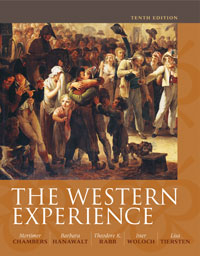1 A) Isaac Newton B) René Descartes C) Francis Bacon D) John Locke E) Joseph Priestly 2 A) the focus of the philosophes' original thought. B) a source of theoretical justifications for the philosophes' programs. C) an inspiring example of the success of reason and experience. D) the major recruiting ground for new philosophes. E) a justification for military adventurism. 3 A) Sensational pamphlets and writing were popular but offered no financial gain because of government restriction. B) The publishing industry created new opportunities for men but effectively none for women. C) Relatively few writers could achieve financial independence without patronage. D) Governments demanded that newspapers seek their permission for publishing stories of current events, but newspapers almost never obtained this permission. E) Writing remained the domain of highly educated talent because it was impossible to get something published without layers of editing and review. 4 A) they felt that all points of view must be treated as equally valid. B) the beliefs they opposed were supported by official power. C) their beliefs rested not on assumptions but on facts. D) they wanted to mobilize the masses. E) they believed they could convince government officials of the rightness of their ideas. 5 A) Montesquieu, who essentially founded political science by writing a comparative study of governments. B) Thomas Hobbes, who transformed ethics from a philosophical to a scientific field of study. C) Adam Smith, who advanced economics by focusing on the mechanical workings of the market. D) Voltaire, who moved history beyond chronicles of battles to analysis of social institutions and culture. E) Immanuel Kant, who attempted to harmonize the notion of absolute moral values with practical reason. 6 Encyclopedia ?A) It openly attacked religion. B) It emphasized the technological and practical nature of science. C) It held philosophy at its core. D) It largely ignored religion. E) It's editors offered no stated purpose or goal. 7 A) the founding of morals on the basis of conscience rather than reason. B) simple majority rule in the administration of government. C) education through the cultivation of natural talents rather than imposition of dry information. D) a social and political system in which individual desires are subordinate to group consensus. E) a return to simplicity to shrug off the trappings of high culture. 8 A) fostered a curious mixture of spirituality and rationalism. B) were limited to the aristocratic class. C) were almost all of multiple genders. D) continued to grow in influence beyond the end of the century. E) were initially a very open and non-secretive form of sociability. 9 A) the proliferation of journals for specialized interests. B) the disappearance of oral traditions in popular culture. C) the appearance of regular newspapers. D) the increasing number and profitability of booksellers. E) the growth of traveling circulating libraries. 10 A) celebrated the structure that classical forms gave to human experience. B) ignored linear song structures in favor of dissonance. C) rebelled against the constraints of classical forms by abandoning structure. D) opened up artistic experience to peasants and the urban working classes. E) emphasized emotional experience as the focus of artistic endeavor. 11 A) aristocrats were replacing the Church as the primary source of patronage. B) artists were suddenly confronted with the need to support themselves commercially. C) critics and public exhibitions were creating a "public sphere" of cultural discourse. D) artists for the first time turned their attention to ordinary people's lives. E) art was the preserve of a very small, provincial group that had no contacts with the "real world." 12 A) almanacs. B) religious tracts. C) entertaining stories. D) romances. E) Enlightenment philosophy. 13 A) highest in the northeast. B) highest in the east. C) highest in the south. D) highest in the southwest. E) the lowest in Europe. 14 A) was provided directly by the state. B) was nonexistent. C) was promoted heavily by the state but not supported with funding. D) was left entirely to the chance of local initiative. E) was made a legal requirement for those families with enough funding to cover the costs at private institutions. 15 A) philosophy. B) music. C) literature. D) painting. E) science. 16 A) essential at all levels of society. B) seen by all to be hollow pretense. C) the sign of membership in the elite. D) linked to a democratic view of society. E) a measure of one's arrogance. 17 Elements of the Philosophy of Newton wasA) Locke. B) Hobbes. C) Rousseau. D) Voltaire. E) Diderot. 18 A) The Philosophical Dictionary. B) The Decline and Fall of the Roman Empire. C) The Spirit of the Laws .D) The Encyclopedia. E) Emile, or Treatise on Education .19 The Spirit of the Laws , a comparative study of governments and societies, wasA) Voltaire. B) Hobbes. C) Montesquieu. D) Kant. E) Rousseau. 20 The Social Contract , Rousseau described the ideal polity asA) a theocracy. B) a government that has returned to a state of nature. C) government in which individuals have a role in making the law to which they submit. D) one led by a natural aristocracy of the educated and wealthy. E) a military autocracy with a professional bureaucracy.





